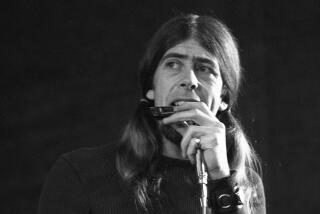Grady Gaines Is Blowing the Blues Again : Old-Time Sax Man Grady Gaines Blows the Blues Again
- Share via
Grady Gaines thought he knew Little Richard well enough by 1957 to dismiss the flamboyant rocker’s constant threats to quit rock ‘n’ roll for the ministry.
At the time, the saxophonist--who makes his Los Angeles debut with the Texas Upsetters revue tonight at Club Lingerie and Saturday at the Long Beach Blues Festival--had been leading the rock piano legend’s live band, the Upsetters, for two years. But Gaines wasn’t prepared for the fateful day on an Australian tour when the group was riding a bus on a ferry and Little Richard started pulling the rings off his heavily bejeweled hands and tossing them into the water.
“Me and the other saxophone player were sitting right in front of him and we tried to stop him, but he overpowered us,” recalled Gaines by phone from a San Francisco hotel room. “He threw everything he had on that was jewelry--chains, rings and bracelets--into the ocean.”
But Little Richard’s decision to quit didn’t affect Gaines and the Upsetters--they returned to Los Angeles, bounced onto a tour with Little Willie John and spent the next 15 years working as a backing band behind such R&B; stars as John, Sam Cooke and Jackie Wilson. Gaines wound up playing on such memorable records as “Keep a Knockin’ ” and Sam Cooke’s “Twisting the Night Away” and “Bring It on Home to Me.”
But the current Texas Upsetters repertoire focuses on an earlier phase of Gaines’ career--the 1952-55 period when he led the studio band for the Houston-based Duke/Peacock label. “Full Gain,” his first album as a leader, was released last year on the New Orleans-based Black Top label and Gaines assembled an all-star aggregation of Duke/Peacock veterans, including his younger brother Roy, a guitarist who’s a fixture on the L.A. jazz/blues club scene.
“I was trying to pull back as much of the old Peacock sound for the blues as I could,” said Gaines. “I wanted Roy and Clarence Holliman because they played on just about every hit record that came out of there. It came out real good--you feel altogether different when you’re doing it for yourself.”
At Long Beach, Gaines shares the Saturday bill with the Fabulous Thunderbirds, Little Milton, Buddy Guy, John Hammond and Johnny Shines. Sunday’s lineup includes boogie king John Lee Hooker, soul/gospel giant Solomon Burke, Koko Taylor, Charles Brown, zydeco’s Terrance Simien and Ronnie Earl. Both concerts are to run from 11 a.m. to 6 p.m.
Gaines, 55, was born in Houston and inspired by R&B; star Louis Jordan to take up saxophone. The Texas city was a thriving blues center in the post-World War II era but Gaines apparently experienced little difficulty breaking in.
“I had the looks and all the women make it easy for you,” Gaines said with a chuckle. “They used to get so many requests for me that the deejays were calling my house trying to get me to come up on the station. They just wanted to see who I was.”
More musical attention came through his studio band tenure at Duke/Peacock, which was enormously influential in establishing the smooth, horn-driven sound of Bobby (Blue) Bland and others.
Gaines’ hard-edged, big-toned tenor sound fell squarely within the Texan saxophone tradition, established by players like Arnett Cobb and Illinois Jacquet. One of his contemporaries was R&B; giant King Curtis, but younger rock fans might identify the sound more with Clarence Clemons of Bruce Springsteen’s E Street Band.
The road years with the Upsetters followed, but the pace finally got to Gaines after 15 years. He quit in 1972, went out for a year with Johnnie Taylor, and then formed a band to play around Houston. The disco era eventually drove Gaines out of music and he tossed his sax into the attic for five years.
He worked as a skycap for United Airlines in the interim, but friends badgered Gaines until he eased his way back into the Houston music scene three years ago. “There’s not too many older saxophone players that can play the way I play,” said Gaines. “The sound is different to the younger (audience) because there’s no one else playing that way now. Everybody else is jumping on these different electrical devices and it leaves a hole for me to just play the old-time, original way.”
More to Read
The biggest entertainment stories
Get our big stories about Hollywood, film, television, music, arts, culture and more right in your inbox as soon as they publish.
You may occasionally receive promotional content from the Los Angeles Times.










